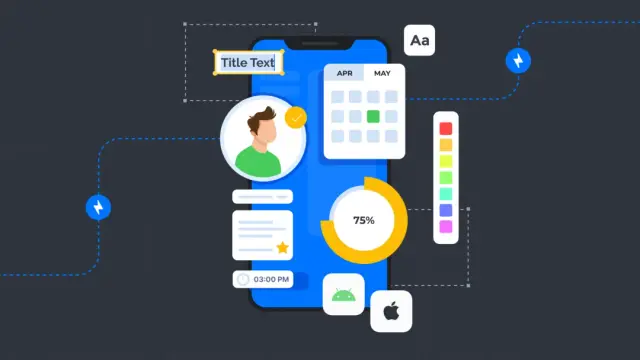The Role of Rapid App Development in the Healthcare Industry
Discover the role and impact of rapid app development in the healthcare industry, its benefits, potential trends shaping the sector, and how AppMaster bolsters this evolution.

The Emergence of Rapid App Development in Healthcare
The healthcare industry is continuously evolving, with technological advancements playing a crucial role in driving innovation and improving patient care. Providers must adapt to an ever-connected world, where efficiency, data-driven decision-making, and customer-centricity are increasingly important.
Rapid app development (RAD) has emerged as a powerful tool for healthcare organizations to keep pace with this dynamic environment. RAD is an approach focused on quickly creating and deploying high-quality applications, emphasizing agility, collaboration, and user experience. It encompasses low-code and no-code platforms, empowering developers and non-technical users to create applications without writing complex code. This streamlined process is well suited for the demands of the healthcare industry, where time is often of the essence, and customization is essential. The adoption of RAD in healthcare has been spurred by several factors, including the need to:
- Digitize and streamline workflows
- Improve patient engagement and communication
- Enhance clinical decision-making
- Comply with regulatory requirements, such as HIPAA
- Reduce development costs
- Minimize technical debt
Moreover, the global COVID-19 pandemic has emphasized the importance of digital transformation in healthcare, driving organizations to seek more agile and effective ways to deliver patient care, track vital data, and support remote workforces.
Key Advantages of RAD for Healthcare
The healthcare industry can benefit greatly from the adoption of RAD for its unique requirements. Some of the key advantages include:
- Speed and Flexibility: RAD platforms enable users to develop applications rapidly, which is crucial in the fast-paced healthcare environment. Since RAD leverages a visual, drag-and-drop interface, healthcare organizations can adapt applications to suit their needs without having to write complex code.
- Reduced Development Costs: Traditional custom-development processes often require significant time and resources. RAD platforms lower these barriers, allowing healthcare providers to create powerful applications at a fraction of the cost and time.
- Collaborative Approach: RAD fosters collaboration between technical and non-technical personnel by providing an intuitive development environment. This collaboration can lead to more customized and user-friendly healthcare solutions, tailored to the needs of various stakeholders, including doctors, nurses, administrative staff, and patients.
- Customization: Healthcare organizations often require custom solutions to address specific needs, such as patient data management, appointment scheduling, or inventory management. RAD platforms let users create tailor-made applications that can seamlessly integrate with existing systems.
- Scalability: RAD platforms offer a scalable approach to app development, allowing healthcare organizations to add or modify features as their needs evolve. This scalability helps providers future-proof their technology investments.
- Minimal Technical Debt: Being able to rapidly make changes and additions to applications without causing negative consequences in the form of technical debt is a significant advantage of RAD platforms. AppMaster.io, for example, promises application generation with no technical debt as it regenerates applications from scratch whenever requirements are modified.
- Regulatory Compliance: Healthcare is a heavily regulated industry, and RAD platforms can help providers ensure their applications adhere to relevant privacy and security standards, such as HIPAA and GDPR.
Real-World Use Cases of RAD in the Healthcare Industry
RAD has demonstrated its potential to transform healthcare across a wide variety of use cases. Some examples of its real-world applications include:
- Patient Portals: RAD platforms can be utilized to create secure, user-friendly patient portals that allow individuals to access their health records, schedule appointments, and communicate with healthcare providers.
- Remote Monitoring Systems: Healthcare organizations can leverage RAD to develop powerful remote monitoring systems that track vital signs, blood glucose levels, and other essential information for patients with chronic conditions.
- Electronic Medical Records (EMRs): RAD tools will enable healthcare providers to develop and deploy fully customizable EMR systems that align with their organization's specific needs.
- Appointment Scheduling: Using RAD, healthcare providers can create intuitive appointment scheduling systems that streamline the booking process and reduce administrative burden.
- Inventory Management: RAD platforms allow for the efficient development and implementation of inventory management applications that help healthcare organizations monitor and optimize their equipment and supplies.
- Clinical Decision Support Tools: Healthcare providers can use RAD platforms to develop evidence-based clinical decision support tools that help clinicians make more informed treatment decisions for their patients.

These real-world use cases are just a glimpse of the potential RAD can offer in transforming the healthcare industry. As technology continues to advance, the adoption of RAD is expected to increase, leading to more innovative applications and systems that improve patient care and optimize healthcare resources.
Overcoming Challenges in Rapid App Development for Healthcare
Overcoming challenges in rapid app development for healthcare is crucial to maximize the benefits and ensure successful implementation of innovative digital solutions in patient care and healthcare operations.
- Compliance with healthcare regulations and data privacy: Ensuring that rapid app development practices align with strict healthcare regulations such as HIPAA and GDPR, and implementing powerful security measures to protect sensitive patient data.
- Integration with existing healthcare systems and interoperability: Overcoming the challenge of integrating new applications with legacy systems and ensuring seamless interoperability between different healthcare platforms for efficient data exchange and continuity of care.
- User acceptance and training for healthcare professionals: Addressing resistance to change and ensuring that healthcare professionals are adequately trained to use the new applications effectively, encouraging adoption and maximizing the benefits of rapid app development.
- Ensuring security and data protection: Implementing stringent security measures to safeguard patient data from potential breaches or unauthorized access, leveraging encryption, authentication, and secure network protocols to maintain confidentiality and integrity.
By addressing these challenges head-on and adopting best practices, healthcare organizations can successfully leverage rapid app development to enhance patient care, improve operational efficiency, and drive digital transformation in the healthcare industry.
Embracing RAD with AppMaster.io's No-Code Platform
As the healthcare industry increasingly adopts rapid app development, choosing the right tools is essential to facilitate efficient app creation and deployment. AppMaster.io provides a powerful no-code platform for designing, building, and deploying applications in a variety of sectors, including healthcare. Its capabilities allow organizations to address challenges and leverage opportunities in the healthcare domain with ease.
AppMaster.io offers a no-code environment for developing backend, web, and mobile applications across platforms. It boasts a comprehensive solution with visual tools such as drag-and-drop interfaces and UI/UX components, making it more approachable for non-technical users. The platform not only empowers teams to build applications rapidly but also ensures that they are scalable, secure, and easy to maintain.
By using AppMaster.io in the healthcare industry, organizations can create:
- Patient portals to provide secure access to medical records and facilitate communication between patients and their care teams
- Remote monitoring solutions for collecting vital signs and tracking patient progress
- Appointment scheduling systems to streamline processes and reduce waiting times
- Inventory management solutions for optimizing supply chains and reducing waste
- Clinical decision support tools to aid healthcare professionals in making informed decisions

As the platform generates applications from scratch, technical debt is significantly reduced. This allows for seamless updates and maintenance, ensuring that healthcare applications stay relevant in the ever-evolving industry. With various subscription options, organizations can choose the plan that best fits their needs, from startups to enterprises.
AppMaster.io also supports integration with existing healthcare systems like electronic medical records (EMRs) and databases to enhance interoperability and streamline workflows. This ensures that newly created applications work seamlessly and efficiently, promoting the healthcare industry's digital transformation.
Anticipating Future Developments and Trends in Healthcare
As technology advances and the healthcare sector continues to evolve, organizations must adapt and leverage new solutions to stay ahead of the curve. Anticipating future developments and trends in healthcare app development is an essential aspect of navigating the rapidly changing industry:
Artificial Intelligence and Machine Learning
AI and machine learning technologies are expected to become more prevalent in healthcare app development. They have the potential to streamline diagnostic processes, facilitate personalized medicine, and improve predictive analytics. Apps using AI and machine learning can support healthcare providers in delivering more accurate diagnoses, optimizing treatment plans, and anticipating patient outcomes.
Virtual Reality Applications
Virtual reality (VR) technology has the potential to revolutionize healthcare app development. From training simulations for medical professionals to therapy apps for patients, VR can significantly impact the way healthcare is delivered and experienced. As VR technology becomes more accessible and affordable, it is expected to gain prominence in healthcare app development.
Internet of Things (IoT) Technologies
The application of IoT technologies in healthcare app development is expected to grow rapidly. Connected devices like wearable sensors, remote monitoring systems, and smart implants can facilitate real-time health tracking and enable proactive care. The integration of IoT technology can further enhance healthcare apps' capabilities and support better patient outcomes.
Telemedicine and Remote Care
As remote care becomes more normalized, healthcare app development will increasingly focus on ensuring seamless telemedical experiences. This might include integrating video consultations, creating user-friendly interfaces, and ensuring compliance with data privacy regulations.
Data Privacy and Security Regulations
Data privacy and security will continue to be paramount in healthcare app development. Ensuring compliance with regulations like HIPAA, GDPR, and others is essential for safeguarding patient data. Healthcare organizations and app developers will need to stay abreast of evolving data privacy requirements and build applications that prioritize security and confidentiality.
In summary, rapid app development (RAD) plays an increasingly important role in the healthcare industry, enabling organizations to create efficient, customizable applications that address evolving challenges and opportunities. With advanced no-code platforms like AppMaster.io, embracing RAD has become more accessible than ever, empowering healthcare organizations to catapult their digital transformation and enhance patient care. The key lies in identifying emerging trends, selecting the right tools, and continually adapting to stay ahead in the fast-paced healthcare industry.
FAQ
Rapid app development (RAD) is an approach focused on quickly creating and deploying high-quality applications, emphasizing agility, collaboration, and user experience. RAD encompasses low-code and no-code platforms that streamline app development.
RAD helps healthcare organizations create customized applications rapidly to address patients' needs, streamline workflow, optimize resources, and enhance clinical decision-making. It also reduces development costs and minimizes technical debt.
Real-world RAD use cases in healthcare include patient portals, remote monitoring systems, electronic medical records, appointment scheduling, inventory management, and clinical decision support tools.
AppMaster.io offers a powerful no-code platform for creating backend, web, and mobile applications. AppMaster's visual tools and efficient processes allow developers to create customized healthcare applications rapidly and with minimal technical debt.
Anticipated trends in healthcare app development include increased use of AI and machine learning, virtual reality applications, IoT technologies, telemedicine, and greater focus on data privacy and security regulations.
Yes, healthcare organizations can create HIPAA-compliant applications using RAD platforms by ensuring that they adhere to required encryption, access control, and other security standards. However, developers must exercise responsibility and due diligence when building healthcare apps.
Using no-code platforms like AppMaster.io in Healthcare allows organizations to create customized, scalable applications quickly and cost-effectively. It reduces development time, minimizes technical debt, and allows for easy maintenance and updates.
RAD helps optimize healthcare resources by streamlining workflows, automating processes, improving scheduling and inventory management, and reducing paperwork, thereby allowing healthcare professionals to focus on delivering quality patient care.
Yes, RAD platforms like AppMaster.io support mobile healthcare application development, allowing organizations to create custom apps for both Android and iOS platforms with a user-friendly interface and seamless integration with existing systems.





